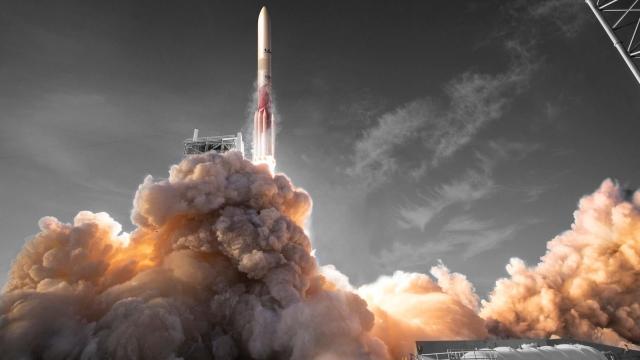Amazon is preparing to launch its first two Project Kuiper internet satellites later this year, booking a trip on board United Launch Alliance’s upcoming Vulcan Centaur rocket, and not with an ABL Space Systems rocket as was the previous plan.
Amazon had previously signed an agreement with ABL Space Systems to launch the two prototype satellites aboard the RS1 rocket by the end of 2022. But those plans have changed as Amazon will now deploy its Kuipersat-1 and Kuipersat-2 satellites aboard the debut flight of a Vulcan Centaur rocket, the company announced on Wednesday. For this rideshare mission, the rocket will launch from Cape Canaveral Space Force Station in Florida and, in addition to the two Amazon satellites, will carry the Peregrine lunar lander — a NASA-funded spacecraft from Astrobotic.
ULA’s Vulcan Centaur was originally supposed to fly in 2020 but the project has suffered from multiple delays. However, the company announced Wednesday that the two-stage rocket is “nearing completion” and scheduled to launch early next year. Amazon booked a total of 38 trips aboard the heavy lift rocket to launch its internet satellites to orbit. The company is still keeping its two launches aboard ABL’s RS1 rocket, but not for its prototype satellites, according to Amazon.
Vulcan Centaur’s first stage is powered by two BE-4 engines built by Blue Origin, which happens to be owned by Amazon founder Jeff Bezos. ULA has been waiting on the company to deliver these flight engines for nearly four years, but Blue Origin appears to have finally delivered.
“The first Vulcan launch vehicle is nearing completion in ULA’s factory in Decatur, Alabama and is awaiting installation of its BE-4 engines,” the company wrote in a statement. “We expect to ship the completed vehicle to the launch site in November.”
Amazon has booked upwards of 92 launches with Arianespace, Blue Origin, and ULA; these carriers are slated to deliver the company’s Project Kuiper satellites to low Earth orbit within the next five years. The company excluded rocket rides with SpaceX — Amazon’s main competitor that’s building its own internet megaconstellation.
Amazon is planning to launch a fleet of 3,236 satellites for the Project Kuiper constellation, while SpaceX wants to send upwards of 42,000 satellites to orbit for Starlink. Elon Musk’s space venture is way ahead of the competition, having already launched more than 3,000 satellites to orbit with its Falcon 9 rocket. Amazon needs to start flying its internet satellites soon if it hopes to stay in the game, and despite its reluctance to launch its satellites with SpaceX’s workhorse launch vehicle.
More: We Can’t Wait for These Futuristic Rockets to Finally Blast Off
